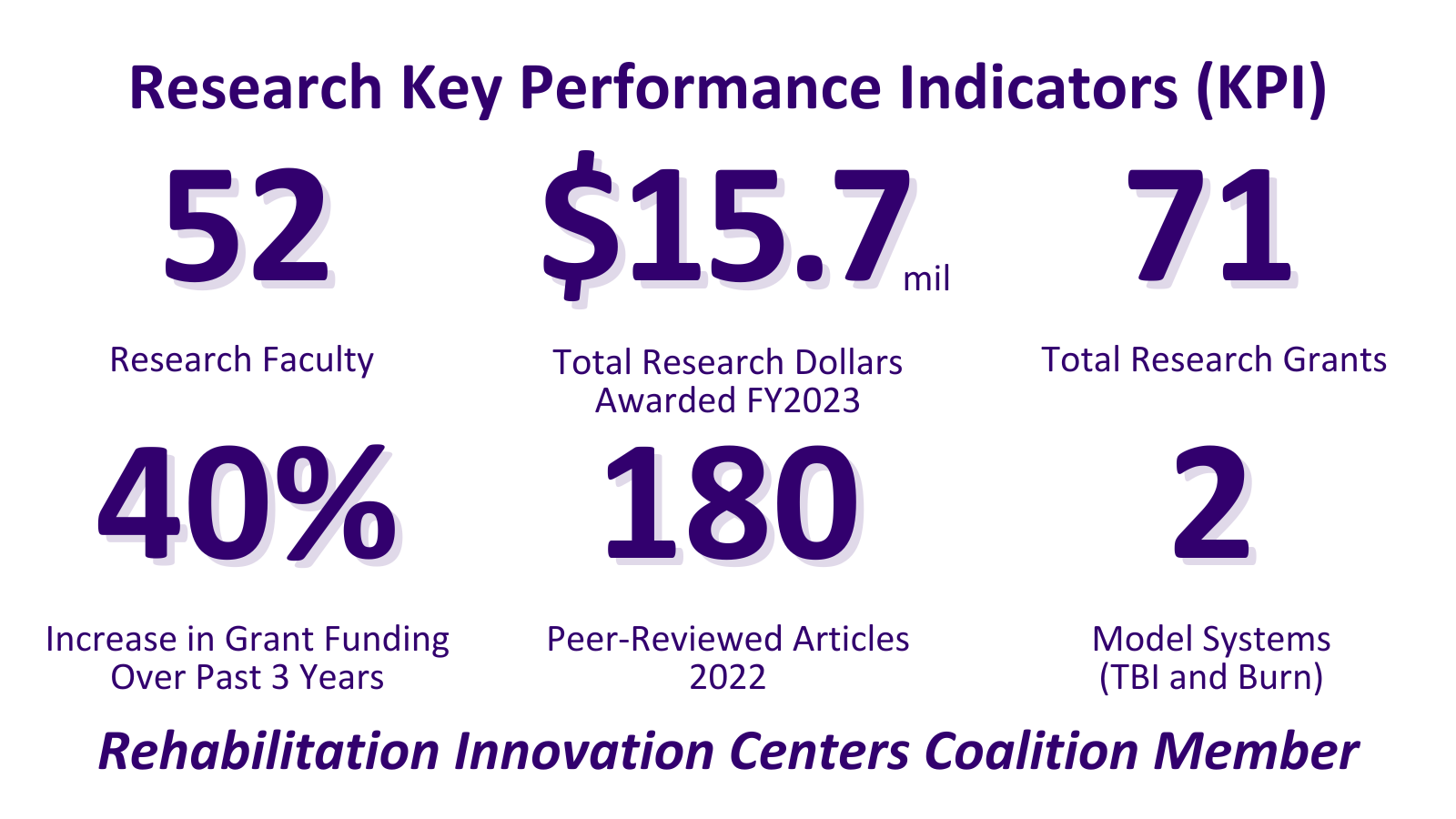
Research
The University of Washington Department of Rehabilitation Medicine has been recognized for decades as an international leader in rehabilitation research. Our researchers and clinician-scientists from a diverse set of rehabilitation professions work collaboratively to perform innovative and impactful research covering a large breadth of patient populations and scientific methodologies.
Research aimed at enhancing the health, function, and quality of life of the communities we serve is integral to our departmental mission.

We recently developed a comprehensive strategic plan focused on conducting the highest quality and most impactful rehabilitation research. Advancing the key focus areas of this strategic plan will enable our department not only to enhance our research program, but also serve as a potential template to strengthen our clinical and teaching programs as well.
To ensure the strategic plan reflects the perspectives of the entire department, a group of faculty, staff, and trainee stakeholders from across departmental divisions were engaged throughout the strategic planning process. Through our process of discovery, we have learned not just about our many strengths, but areas where we need to build.
We envision a future with a diverse, collaborative, and innovative research culture that allows us to have the greatest possible impact on the community that we serve. Our strategic plan is a roadmap to realize this vision.
Americans with Disabilities Act Knowledge Translation Center (ADAKTC)
The Knowledge Translation (KT) Center supports the ADA National Network (ADANN) in helping people with disabilities, professionals, employers, businesses, and others understand their rights and responsibilities under the Americans with Disabilities Act (ADA). The primary goal of the project, in collaboration with the ADANN, is to perform activities that increase the implementation of the ADA in communities across the United States.
Burn Model System (BMS) National Data and Statistical Center
The center is a centralized resource for researchers, data collectors, and clinicians within and beyond the BMS. Center researchers provide data collection and data management expertise, statistical and methodological assistance and services, access to the BMS National Longitudinal Database (BMS NDB), overviews of the data contained in the BMS NDB, and training and technical assistance to BMS Centers.
Center for Limb Loss and MoBility (CLiMB), VA
CLiMB has been continuously funded by VA RR&D since 1997, including more than $6 million in current center funding and approximately $30 million in investigator-initiated funding over the past five years. The center’s mission is to preserve, restore, and enhance functional mobility, independence, and participation in veterans with lower limb musculoskeletal impairment or limb loss. CLiMB principal investigators are scientists and clinician-scientists from the UW departments of Rehabilitation Medicine, Orthopedics, and Mechanical Engineering. CLiMB’s multidisciplinary team of principal investigators, staff, students, and postdocs focus on a range of scientific domains across the pathway, from basic science through clinical research and translation.
CLEAR Center, UW
The Clinical Learning, Evidence and Research (CLEAR) Center is a musculoskeletal research center led by a multidisciplinary team at the University of Washington. Founded in 2017, the CLEAR Center is funded by an initial $3.75 million grant from the from the National Institute of Arthritis and Musculoskeletal and Skin Diseases (NIAMS).
Multiple Sclerosis Rehabilitation & Wellness Research Center, UW
The Multiple Sclerosis Rehabilitation & Wellness Research Center is a group of clinician-scientists committed to investigating novel interventions to help people with multiple sclerosis (MS) live their best lives while training the next generation of researchers and providers. Center clinician-scientists focus on innovative clinical research to improve the delivery and utilization of effective treatments for MS and comorbid conditions, including chronic pain, fatigue, and depression, to affect system-level changes to improve care for people living with MS.
Northwest Regional Spinal Cord Injury System (NWRSCIS)
The NWRSCIS is a regional center of spinal cord injury care, research, and education. The mission of the NWRSCIS is to improve the lives of people with SCI through excellent patient care, research, and education. The center provides specialized care to persons with SCI, conducts clinically relevant research, and disseminates the most useful, evidence-based information to people with SCI, their families, and professionals. Programs and services are provided at both the UWMC and HMC.
Traumatic Brain Injury (TBI) Model System, UW
The UW TBI Model System is one of 16 government-funded model system centers in the United States. Each center provides a multidisciplinary system of rehabilitation care, including emergency, acute, and post-acute services. The largest long-term study of people who have experienced TBI, the TBI Model System seeks to understand how people recover from brain injury and what health issues continue to persist. Center researchers recruit participants who are receiving inpatient care at HMC or UWMC.
